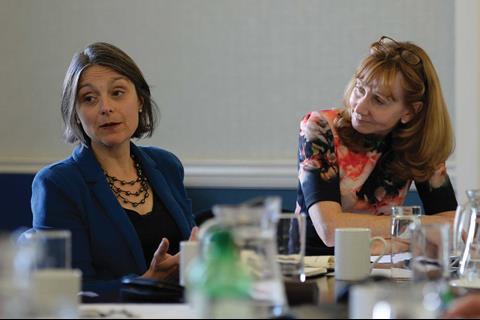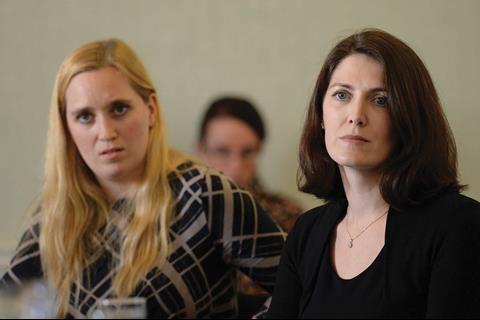Being a lawyer is stressful and legal workplaces are not renowned for their inclusivity. Eduardo Reyes reports from a Gazette roundtable which considered the profession’s mental wellbeing challenges.
The pressures of life in the legal profession are widely acknowledged. To the traditional demands of long hours, technical perfection, adversarial competitiveness and ambition, one can add more contemporary challenges. These include the debt mountain that can accrue from higher education, reduced career stability, and a client or funding base consistently demanding more for less.
A previous Gazette roundtable (6 October 2014) heard that law is associated with certain character traits – perfectionism, fear of failure and passivity – which can contribute to poor mental health. Problems with depression and anxiety are more common among lawyers than the population at large. Failure to address these problems exacts a human cost and poses a commercial risk.
The professionals convening for this event meet ahead of World Mental Health Day (10 October) to define the legal profession’s wellbeing challenges and consider its responses.
‘Destructive stress’ – how to identify, prevent or manage it – is at the centre of much of the discussion. But the challenge is not straightforward and participants come at it from a range of perspectives. How, for example, is the absence of wellbeing defined and identified?
Psychoanalyst Dr Mary Bradbury points out: ‘Sometimes we fall ill with a mental health problem and it’s not to do with stress. We just have a mental health problem. Sometimes, too, we’re able to work at a high level, perfectly capably, while we’re unwell.’
HR departments say they want to talk about [mental health] more openly, but whether employees will talk more openly remains to be seen – Max Harris, Baker & McKenzie
Ann Charlton, a professional coordinator at lawyer support charity LawCare, notes: ‘A mental health [problem] is a specific illness. It’s something that is diagnosable and treatable.’ But in the absence of universal acceptance of such a straightforward proposition, she says, ‘mention mental health to most employees and they’ll run a mile’.
In that context, to use a term like ‘stress’ is to start a conversation. ‘If you say, “we can see how stressed you are, you’ve got to do something about controlling [it]”, that is much more acceptable,’ Charlton says.
Bradbury adds: ‘There’s no need to reinvent the wheel. There’s fantastic work that looks at stigma coming out from the Institute of Psychiatry, from [campaign group] Time To Change and from the New Economics Foundation.’
Placing discussion on mental health and stress in the broader societal context is helpful, she argues: ‘One way of framing this is to say that we might have high-pressure jobs – active jobs – that we enjoy. But when we’re stressed we can’t work at our best, and that’s when we need to be problem-solving.’
Bruce Macmillan, general counsel at Legal Practice Technologies and an in-house lawyer since 1998, cites the importance of culture and environment in the workplace: ‘One of the biggest issues I’ve had to deal with over the years is people who create problems for their peer group, and how to unpack that.’
Baker & McKenzie lawyer Max Harris, chair of the Law Society’s Junior Lawyers Division, draws a distinction between ‘stress’ on the one hand and ‘distress’ (‘where the real problem lies’).
‘Some people will say, “I have five things to do today, I’m kind of stressed about this but I know I can do it if I do it in this way”,’ he says. ‘By the end of the day they’ll be fine and actually feel quite productive and happy.
‘Then there’s another kind of stress, in exactly the same scenario, where someone else will react differently and there is a problem.’
He adds: ‘The big City firms are being much more proactive. They’re starting to create internal divisions that focus on mental health, which is a positive step. HR departments say they want to talk about it more openly, but whether employees will talk more openly remains to be seen.’
‘There is evidence,’ Bradbury agrees, ‘to show that we are becoming more inclusive and more tolerant about mental ill-health; partly because we know one in four of us may suffer from a mental health problem in the course of our lives.’
But how much can a law firm or legal department realistically do about destructive stress? Can the seemingly unlimited demands of clients be ‘managed’, for example? And is a ‘long-hours culture’ something that can be addressed when it seems to be hard-wired to ambition?
Lewis Silkin partner Karen Baxter says: ‘It goes back to terminology. Is it a “stressful” environment or is it actually a “high-pressure” environment? It’s fair to say that law firms are high-pressure environments so the issue is how that pressure is managed. If you’ve got somebody who is managing it badly, then it will trickle all the way through [the team].’
Macmillan argues that clients have an interest is good management practice. ‘On the two occasions I have been exposed as a result of law firm failures, that was a product of poorly managed staff being overworked and exhibiting stress responses,’ he recalls. ‘In the last few panels I’ve run, I’ve ascertained what the chargeable hours target [of the lawyers] is.’
Macmillan does not want to see a target of more than 1,400 chargeable hours a year and includes a requirement that no work should be done during ‘non-working hours’.
With billable hours targets running to 2,000 and upwards in some practices, a change in culture is clearly some way off – though discussing the issue in the context of risk management pushes it up the agenda for both law firms and clients
Communication
But good management is not just about project management and setting technical parameters of the sort described by Macmillan. Effective communication is also crucial, not least because a team member could have external pressures arising from sources outside the office that affect their work.
Emma Nash, a family lawyer at Spring Law, says colleagues need to know when to recognise this as an issue and be aware of ‘what questions to ask’.
A formidable barrier to openness is the firmly rooted idea that admitting to a failure to cope with any scenario will arrest or stall one’s career. So the ‘tone from the top’ is critically important, Linklaters’ global head of talent management Kate Richardson-Moore says: ‘As part of our health and wellbeing programme [we] managed to find a couple of partners who were willing to talk about their own experiences.’
Though these talks concerned physical issues, rather than mental, they proved hugely helpful: ‘Somebody is on a pedestal, [and it appears that] nothing is ever wrong with them, that they’re absolutely perfect as a partner. Then they tell their story of how they dealt with cancer or serious illness – you can hear a pin drop in the room.
‘I’m a firm believer in the power of personal stories and [they] set the tone for what the culture can be.’
Nash concurs: ‘It’s hugely comforting when you’re struggling yourself to hear that someone else is struggling as well or has struggled – and they’ve got over it. Particularly if it’s someone who is ahead of you, doing well, who you respect.’
The importance of such frankness, some observe, is enhanced when social media is so pervasive. That is a space where peers, friends and family often present a ‘perfect’ image of themselves coping effortlessly with all that life has to throw at them.
Further resources:
The way we work
Technology more generally shapes the way lawyers now work, and some awareness of its psychological ramifications forms part of the discussion. The ability to receive and reply to emails remotely is a particular talking point. One might consider this to be an additional burden piled on to one’s office duties, but Wedlake Bell partner Suzanne Gill sees it differently: ‘I remember life before emails. Being able to pick them up wherever you are has improved and reduced my stress levels.
‘I remember when my first child was born. If I wanted to put baby to bed and do some work in the evening, I carried it home with me on the bus. If something came up at 5.30pm, that was it – either I had time to print it off and shove it in the bag or I did not. Now I know I can access whatever I need to. I’ll say to people, “I’m not available between this hour and that hour” – it could be a reception, bath time for a child, anything. But I know I can pick up [the work] later. Maybe it’s the type of person who is attracted to the law. For me, being able to retain that degree of control is helpful.’
Being ‘constantly available’ affects people differently, Harris notes. He is attending the roundtable on an annual leave day: ‘I don’t think my firm expect me to check my BlackBerry on holiday, [but] ‘I’d rather know that I’m keeping up to date.’
Bradbury, meanwhile, counters that people need times when they are not feeling under pressure to respond, something she describes as a ‘non-media moment’.
So how precisely can good management minimise ‘destructive stress’? Macmillan explains: ‘One of the most important challenges for us is to make sure that people can step away if they need to and that [others] can cover for them effectively, so people won’t walk back into a “wall” of work. If that isn’t possible, management has failed.
‘Some of the biggest messes I’ve seen have occurred because people have tried to do more while they’re away. With the best will in the world, what can you do with a BlackBerry in the middle of France, especially at the end of the day, when your mind is elsewhere?’
Training people to be ‘comfortable with being switched off’ is a ‘good management discipline’, he avers.
Yet this is not unproblematic, as Joy Reymond, head of vocational rehabilitation services at employee benefits specialist Unum, observes: ‘The manager has a real conflict where they have a duty of care and requirements relating to productivity, results and profitability.’ Such an ethos breeds a culture that rewards ‘survival of the fittest’ among junior lawyers in particular.
Might less traditional law firm models offer a partial solution? Perhaps, suggests Polly Jeanneret, lawyer at Halebury.
Halebury is a firm made up of former in-house lawyers that has flexible hours and other working arrangements built in to its business model. Having trodden ‘the traditional path’ at large commercial firms, Jeanneret says she now works ‘in a structure… established to put the wellbeing of the lawyer at the heart of what they do’.
Tasks which are ‘extremely difficult and demanding’, she notes, are more manageable when ‘you control your career’ and better control your daily life.
Gill notes there is a benefit from the size of firm she now works in. Having worked in a very large law firm with what felt like ‘armies of HR people’, Gill’s present colleagues are less apt to simply think ‘this sort of stuff is done by human resources’. One consequence is that partners take on greater responsibility for staff issues.
At the table
Emma Nash, Spring Law; Karen Baxter, Lewis Silkin; Polly Jeanneret, Halebury; Max Harris, Baker & McKenzie; Ann Charlton, LawCare; Leila Lesan, The Law Society; Kate Richardson-Moore, Linklaters; Bruce Macmillan, Legal Practice Technologies; Eduardo Reyes, Law Society Gazette; Dr Mary Bradbury, psychoanalyst; Suzanne Gill, Wedlake Bell; Joy Reymond, Unum
Linklaters’ Richardson-Moore interjects: ‘In a larger organisation you have more resources, so for me it’s about how you organise them so that there is cover and good communication among teams. In that way individuals don’t feel that pressure.
‘Because you are working in a global firm, you can’t cover all time zones, all hours of the day; it’s just not physically possible unless you don’t sleep. What I’ve found from talking to people is that stress is caused by lack of communication about what is expected. So, some partners expect people to check their BlackBerrys, and if that’s clear then you know where you stand. You can do what’s required. Others are just not sure: am I supposed to check or not? That in itself creates stress.’
Communication on this point should extend to communication with clients. ‘Most clients can be educated,’ Jeanneret says. With established clients a rapport can be built so that ‘they understand you, they know what your life is – that on Fridays you pick the kids up, for example. You’re just two normal people conducting business’.
‘I think lawyers in City firms create pressures and deadlines that the clients don’t necessarily want,’ Gill observes. ‘I was talking to someone last week who works in-house at one of the banks. She said she’s now bored of the times she’s asked a lawyer to do something on a Friday and she’s got it back before Monday morning.’
The bank, Gill notes, ‘didn’t want it and doesn’t need it at that point’. The correct response, the in-house lawyer told Gill, ‘is to come back and say, “Thanks – you didn’t mention when you’d like it by, is Tuesday OK? Would you like it sooner? Would you like it later?”. Then it’s the client’s decision.’
The lawyer can also be better placed to pick up ‘genuine emergencies’ when artificial pressures are removed.
Holistic approach
Reymond suggests that the the legal profession is in a state of ‘transition’ around improving its mental health and wellbeing. Grouping law with finance and trading, she notes that ‘traditionally’ the pressures of the job led to a ‘winnowing’ out of people which was an accepted process. ‘I wouldn’t say they didn’t value their people,’ she notes, but there was a clear perception that many would simply leave.
One indicator of change, Richardson-Moore says, is a better acceptance within firms of the relationship between diversity and wellbeing. This makes business sense too, she notes: ‘[When] your people come to work… you have the responsibility of enabling them to be at their best – from a commercial perspective so they do a great job, but also so they can be themselves.’
The link made between diversity and wellbeing is helpful, she insists, because recognising that ‘everybody is different’ is key to ‘getting the best out of them’. The fact that maintaining that understanding may involve conversations that feel ‘difficult’ does not diminish the importance of having them.
Not all responsibility lies with the employer or law firm, Gill reflects. So long as the firm has created the right culture, the individual needs to communicate properly. ‘When something does go wrong then obviously it’s very difficult for the person who is ill – but firms can’t do it on their own,’ she says. Recalling one colleague who went absent and was uncontactable following a serious domestic incident, she notes: ‘It was very difficult to deal with the rumourmonger network.’ That scenario made managing the absence and an ordered return to work that much more awkward, Gill says.
Is it appropriate that a discussion about mental health spends so much time on ‘good management’? Absolutely, those present confirm.
‘As much as possible,’ Bradbury says, ‘we [should] do what we can to ameliorate the negative impact of stress with coping mechanisms and high-quality management.’ She adds: ‘There’s lots of evidence now which shows workplace stress makes us ill, physically and mentally, but we don’t necessarily have to be ill when we’re stressed.’ It is a subject, she suggests, that organisations need to improve their ‘literacy’ around.
Baxter observes: ‘In a law firm… people aren’t promoted because they’re really good people managers, they’re promoted because they’re good lawyers. They’ve got good hours, and they’re meeting their financial targets.’
The result, she says, is a dysfunctional approach to communicating with staff, which is central to today’s topic. Baxter alludes to a common way ‘you show someone in a law firm that they’re not doing well enough – you don’t give them work.
‘You leave them not having the work to do, so the person sitting next to them, who’s really good, can be absolutely overloaded. The person who’s not so good can go home at 5pm. You’re not going to tell them [the reason]; they should just pick up on the fact that they’re not being given work.’
LawCare’s Charlton draws the discussion to a close with a stark recommendation: ‘Look at all the research. This is one of the most stressed professions and I don’t think it is particularly inclusive. If we want to maximise what we achieve from the people working with us and for us, we have to manage them appropriately and learn from what experts are telling us. I think firms are going to have to spend more money on training their team leaders, managers and departmental heads.’
- The roundtable was kindly sponsored by Unum





































No comments yet